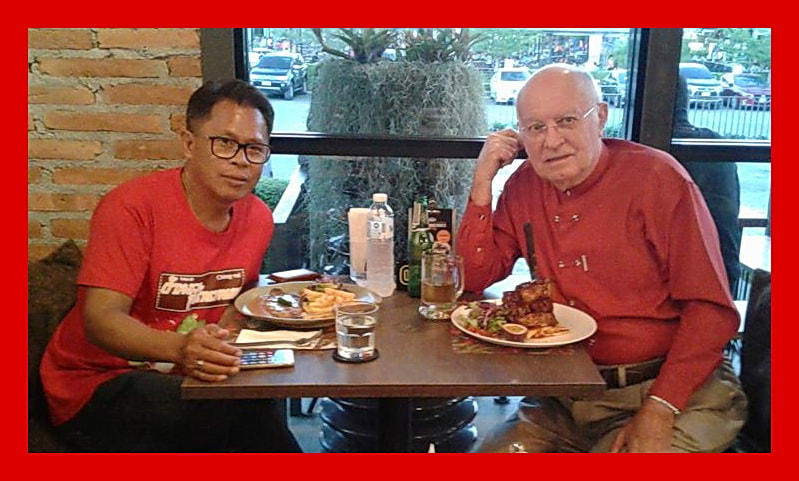|
Every year at this time I ruminate on what makes Thanksgiving, the US holiday.
This year, 2019, I recall an essay I wrote for this website three years ago and wish to use it to reconsider what enables and underlies a successful Thanksgiving. A few days ago a former student of mine who immigrated to the USA about ten years ago became a naturalized US citizen. She is very happy about it, and this Thanksgiving has special meaning for her, and her sense of being newly settled in Virginia. A close friend who graduated with her settled in Canada. They have Thanksgiving there, too: a harvest festival on the second Monday of October. She also feels settled. Their close friend, a Muslim woman feels settled just a few miles from the university here in Thailand where they all graduated on the same day. Even though she is Thai, and a fourth generation resident, being a Muslim in the middle of a community that is half and half Buddhist and Roman Catholic, she feels less settled than her neighbors. Settler narratives make a difference. I own my sense of being an Illinois farm boy. It is who I am no matter that I live on a Northern Thai farm about as many nautical miles from Illinois as can be. It is the feeling of being settled that counts when it comes to Thanksgiving. I could easily get back to that. Essential to our clan’s settlement is the whole idea of settlement. “Settler Colonialism” is the emerging term for the particular type of process engaged in by immigrants from Europe into North America in the 17-19th centuries. Settler colonialism included certain concepts: (1) that the settlers were entitled to move where they went. (Some were compelled, in fact). (2) That there was no need to take prior residents into account. (3) That this movement reiterated a sacred (Biblical) precedent and mandate. (4) That the legal practices the settlers developed were sovereign. (5) That ranching, farming and manufacturing were the standard enterprises (mining, shipping, commerce and forestry were aspects in support of them). The US national narrative tends to boldly celebrate this. Significant episodes revolve around successful establishment of settlements and elimination of threats. Heroes are those who pushed colonization forward. Alternative narratives were nullified in various ways. Ironically, for a migrant such as me, the least considered component of Thanksgiving is the concept of settlement. So I wonder what other narrative might be possible? Narratives of belonging have no concept of interruption, resettlement, or ownership. Eternal things cannot be owned. Wellbeing is not dependent on possessing such things. Even more absurd is the idea of owning other living beings or of a hierarchy of human authority. Instead there is unquestionable but inscrutable connectivity. In such a cultural ethos, thanksgiving is a response to particular events (a successful hunt, for example) rather than to abstract feeling and cyclical tradition. Narratives of immigration are concerned with transition. Change is the constant. The destination is ahead. Narratives of immigration are nostalgic as well as hopeful, rather than satisfied and defensive. They espouse mystery, celebrate passages, and expect thresholds. Thanksgiving is concerned with incidents of adaptation and accommodation. Narratives of immigration are recapitulated in sacramental ceremonies in which divine-human encounters in the past presage ones in the present and portend ones to come. Thanksgiving is anticipatory. These are two alternative narratives. They are irreconcilable with a settler narrative. In order to celebrate the Great American Thanksgiving it is not necessary to pay attention to any of these narratives. Consideration of the implications of settler colonialism could come at another time. Ironically, the pressure to do so on Thanksgiving comes from the imposition of a meta-narrative about patriotism, national heritage, and the myth of the first settlers. The story of the Pilgrims impels a response that our collective amnesia could otherwise avoid. The sober conclusion to critical review of settler colonization of North America is that the colonists cared nothing for their predecessors in the land and willfully drove them away as obstructions to settlement. We in any generation after these pioneer settlers are beneficiaries of their ruthlessness. The remnant of the original residents who survive, as well as recent immigrants, either do not share in the Thanksgiving or have capitulated to the principles of settler colonialism upon which the Thanksgiving Harvest Festival is founded and conducted. It takes equal measures of tolerance and hopefulness for someone like our new Virginian from Thailand to buy into the Pilgrim story and to see turkeys and pumpkin pie as the food of choice on the fourth Thursday of November. An immigrant narrative, celebrating human diversity in America, would be far more satisfying and more accurate for at least a quarter of the US population. Her being settled has none of the coldblooded confidence that my ancestors brought to Illinois. As for me, belonging to Illinois anymore takes mental dexterity, too. Pramote and I will not even be able to access (or afford) a big turkey dinner this year. If we “eat out” it would be using Thanksgiving as the excuse rather than as a celebration of identity. For us the sense of authentic thanksgiving would be based on a narrative of belonging.
0 Comments
Leave a Reply. |
AuthorRev. Dr. Kenneth Dobson posts his weekly reflections on this blog. Archives
March 2024
Categories |
| Ken Dobson's Queer Ruminations from Thailand |
|

 RSS Feed
RSS Feed
